BULAW1502 Law Assignment: Analyzing Claims in Contract Dispute
VerifiedAdded on 2023/03/23
|8
|1948
|39
Case Study
AI Summary
This case study delves into a contract law scenario involving a buyer and seller dispute over a courier van. The analysis focuses on whether a valid contract was formed based on the principles of offer, acceptance, and consideration. The buyer's potential claims, such as breach of contract and the availability of remedies like specific performance or injunction, are examined. The seller's potential defenses, such as the argument that the contract wasn't finalized due to the cheque not being cashed, are also considered. The case study further defines and explains key legal concepts including chattel mortgage, perfection, fixture, Torrens system of land registration, and leasehold, providing a comprehensive understanding of relevant legal principles. Desklib provides access to similar solved assignments and past papers for students.
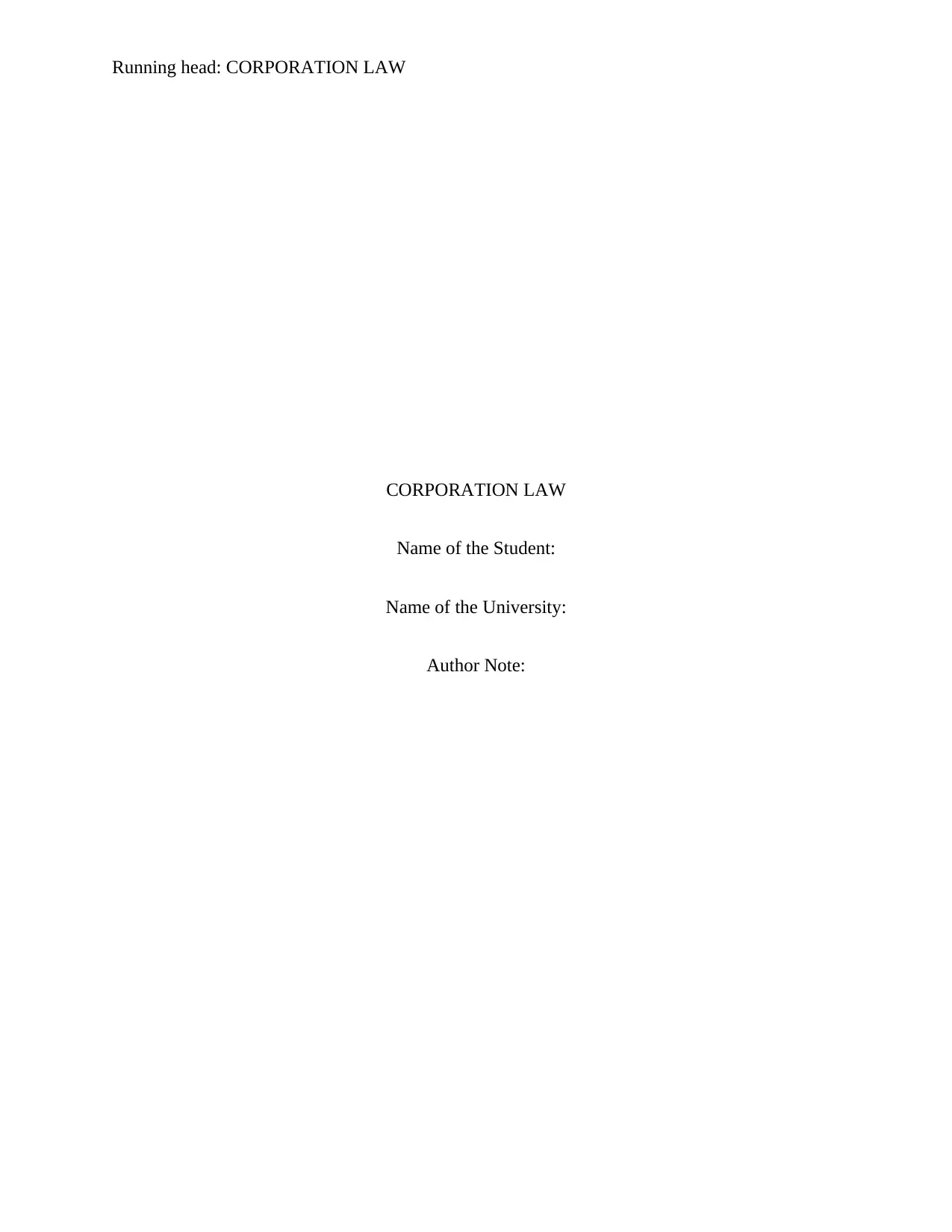
Running head: CORPORATION LAW
CORPORATION LAW
Name of the Student:
Name of the University:
Author Note:
CORPORATION LAW
Name of the Student:
Name of the University:
Author Note:
Paraphrase This Document
Need a fresh take? Get an instant paraphrase of this document with our AI Paraphraser
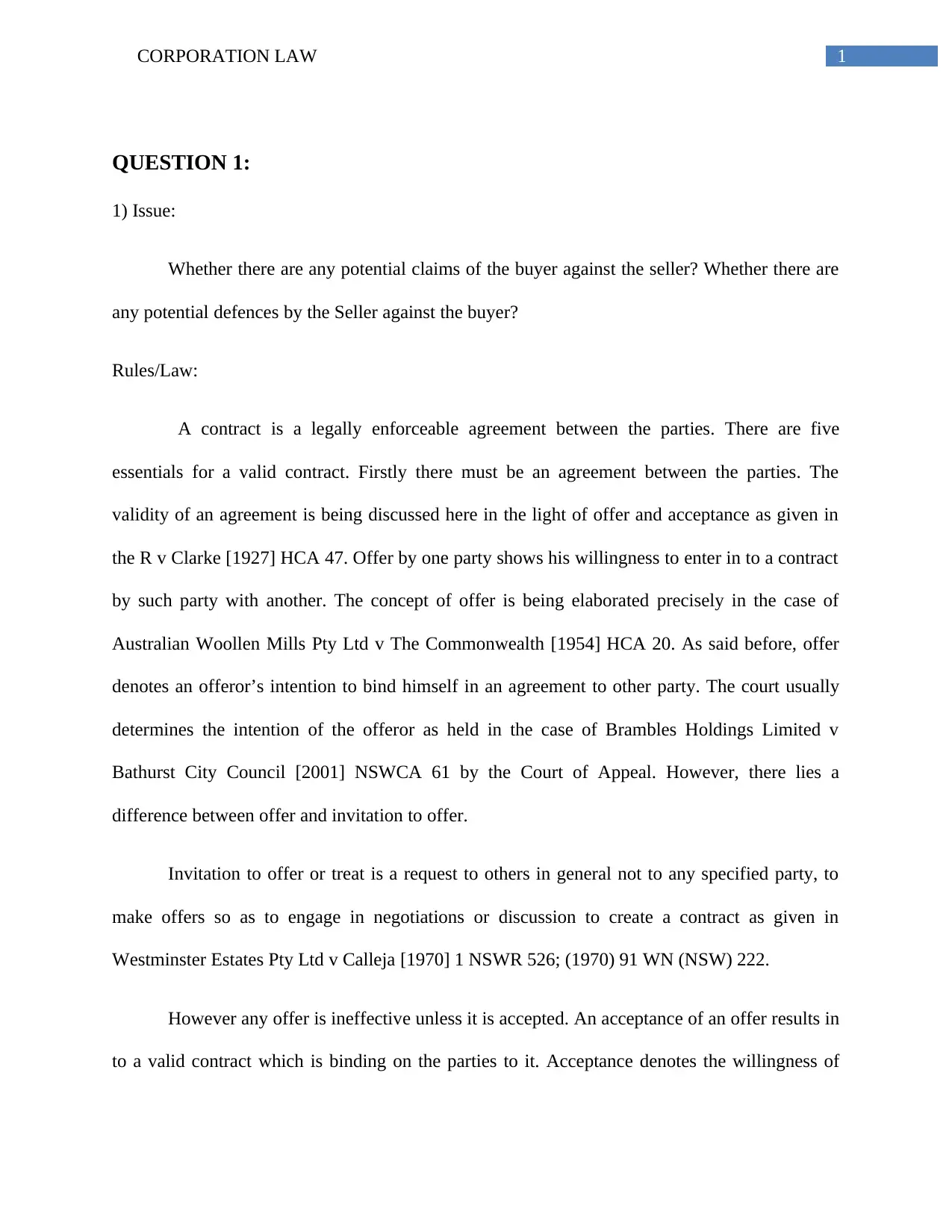
1CORPORATION LAW
QUESTION 1:
1) Issue:
Whether there are any potential claims of the buyer against the seller? Whether there are
any potential defences by the Seller against the buyer?
Rules/Law:
A contract is a legally enforceable agreement between the parties. There are five
essentials for a valid contract. Firstly there must be an agreement between the parties. The
validity of an agreement is being discussed here in the light of offer and acceptance as given in
the R v Clarke [1927] HCA 47. Offer by one party shows his willingness to enter in to a contract
by such party with another. The concept of offer is being elaborated precisely in the case of
Australian Woollen Mills Pty Ltd v The Commonwealth [1954] HCA 20. As said before, offer
denotes an offeror’s intention to bind himself in an agreement to other party. The court usually
determines the intention of the offeror as held in the case of Brambles Holdings Limited v
Bathurst City Council [2001] NSWCA 61 by the Court of Appeal. However, there lies a
difference between offer and invitation to offer.
Invitation to offer or treat is a request to others in general not to any specified party, to
make offers so as to engage in negotiations or discussion to create a contract as given in
Westminster Estates Pty Ltd v Calleja [1970] 1 NSWR 526; (1970) 91 WN (NSW) 222.
However any offer is ineffective unless it is accepted. An acceptance of an offer results in
to a valid contract which is binding on the parties to it. Acceptance denotes the willingness of
QUESTION 1:
1) Issue:
Whether there are any potential claims of the buyer against the seller? Whether there are
any potential defences by the Seller against the buyer?
Rules/Law:
A contract is a legally enforceable agreement between the parties. There are five
essentials for a valid contract. Firstly there must be an agreement between the parties. The
validity of an agreement is being discussed here in the light of offer and acceptance as given in
the R v Clarke [1927] HCA 47. Offer by one party shows his willingness to enter in to a contract
by such party with another. The concept of offer is being elaborated precisely in the case of
Australian Woollen Mills Pty Ltd v The Commonwealth [1954] HCA 20. As said before, offer
denotes an offeror’s intention to bind himself in an agreement to other party. The court usually
determines the intention of the offeror as held in the case of Brambles Holdings Limited v
Bathurst City Council [2001] NSWCA 61 by the Court of Appeal. However, there lies a
difference between offer and invitation to offer.
Invitation to offer or treat is a request to others in general not to any specified party, to
make offers so as to engage in negotiations or discussion to create a contract as given in
Westminster Estates Pty Ltd v Calleja [1970] 1 NSWR 526; (1970) 91 WN (NSW) 222.
However any offer is ineffective unless it is accepted. An acceptance of an offer results in
to a valid contract which is binding on the parties to it. Acceptance denotes the willingness of
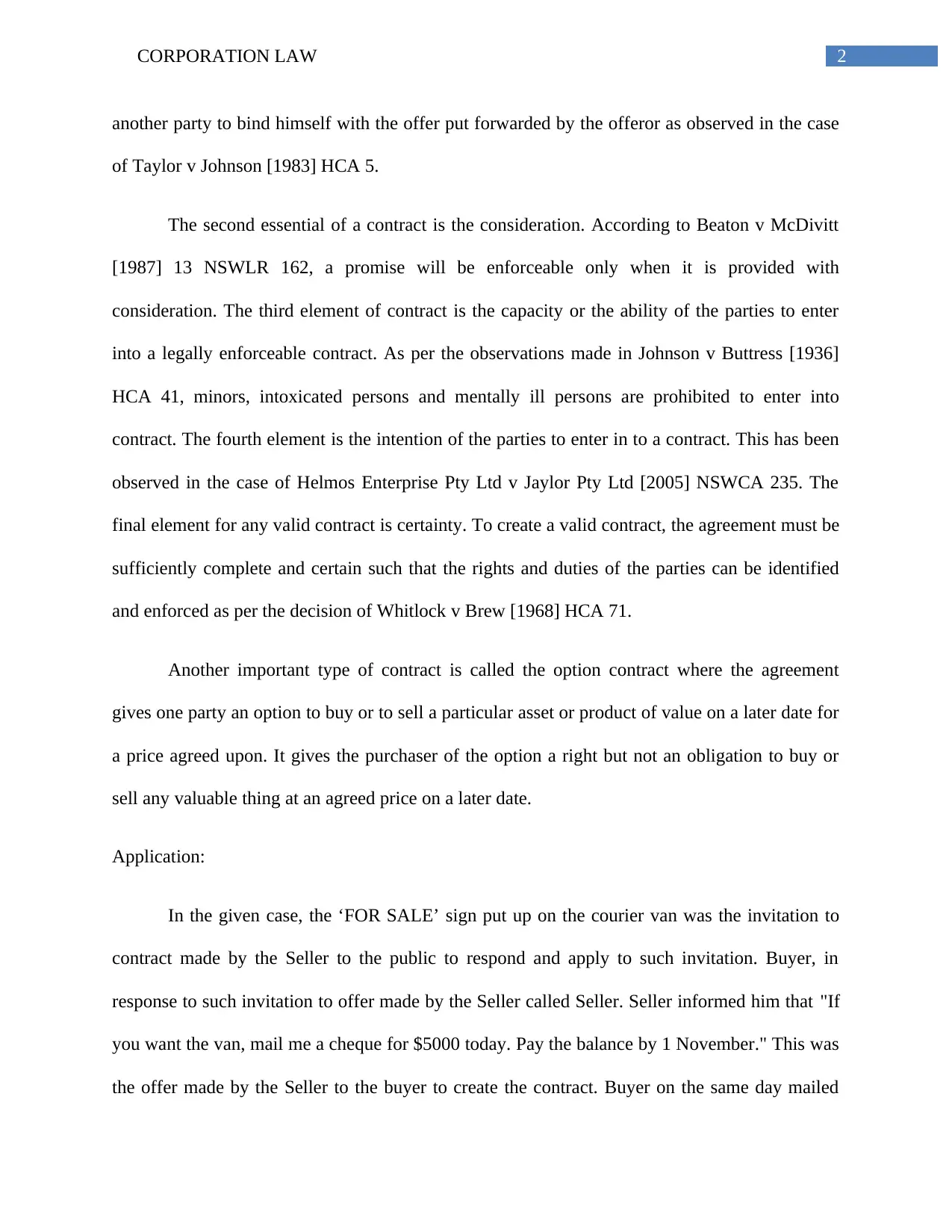
2CORPORATION LAW
another party to bind himself with the offer put forwarded by the offeror as observed in the case
of Taylor v Johnson [1983] HCA 5.
The second essential of a contract is the consideration. According to Beaton v McDivitt
[1987] 13 NSWLR 162, a promise will be enforceable only when it is provided with
consideration. The third element of contract is the capacity or the ability of the parties to enter
into a legally enforceable contract. As per the observations made in Johnson v Buttress [1936]
HCA 41, minors, intoxicated persons and mentally ill persons are prohibited to enter into
contract. The fourth element is the intention of the parties to enter in to a contract. This has been
observed in the case of Helmos Enterprise Pty Ltd v Jaylor Pty Ltd [2005] NSWCA 235. The
final element for any valid contract is certainty. To create a valid contract, the agreement must be
sufficiently complete and certain such that the rights and duties of the parties can be identified
and enforced as per the decision of Whitlock v Brew [1968] HCA 71.
Another important type of contract is called the option contract where the agreement
gives one party an option to buy or to sell a particular asset or product of value on a later date for
a price agreed upon. It gives the purchaser of the option a right but not an obligation to buy or
sell any valuable thing at an agreed price on a later date.
Application:
In the given case, the ‘FOR SALE’ sign put up on the courier van was the invitation to
contract made by the Seller to the public to respond and apply to such invitation. Buyer, in
response to such invitation to offer made by the Seller called Seller. Seller informed him that "If
you want the van, mail me a cheque for $5000 today. Pay the balance by 1 November." This was
the offer made by the Seller to the buyer to create the contract. Buyer on the same day mailed
another party to bind himself with the offer put forwarded by the offeror as observed in the case
of Taylor v Johnson [1983] HCA 5.
The second essential of a contract is the consideration. According to Beaton v McDivitt
[1987] 13 NSWLR 162, a promise will be enforceable only when it is provided with
consideration. The third element of contract is the capacity or the ability of the parties to enter
into a legally enforceable contract. As per the observations made in Johnson v Buttress [1936]
HCA 41, minors, intoxicated persons and mentally ill persons are prohibited to enter into
contract. The fourth element is the intention of the parties to enter in to a contract. This has been
observed in the case of Helmos Enterprise Pty Ltd v Jaylor Pty Ltd [2005] NSWCA 235. The
final element for any valid contract is certainty. To create a valid contract, the agreement must be
sufficiently complete and certain such that the rights and duties of the parties can be identified
and enforced as per the decision of Whitlock v Brew [1968] HCA 71.
Another important type of contract is called the option contract where the agreement
gives one party an option to buy or to sell a particular asset or product of value on a later date for
a price agreed upon. It gives the purchaser of the option a right but not an obligation to buy or
sell any valuable thing at an agreed price on a later date.
Application:
In the given case, the ‘FOR SALE’ sign put up on the courier van was the invitation to
contract made by the Seller to the public to respond and apply to such invitation. Buyer, in
response to such invitation to offer made by the Seller called Seller. Seller informed him that "If
you want the van, mail me a cheque for $5000 today. Pay the balance by 1 November." This was
the offer made by the Seller to the buyer to create the contract. Buyer on the same day mailed
⊘ This is a preview!⊘
Do you want full access?
Subscribe today to unlock all pages.

Trusted by 1+ million students worldwide
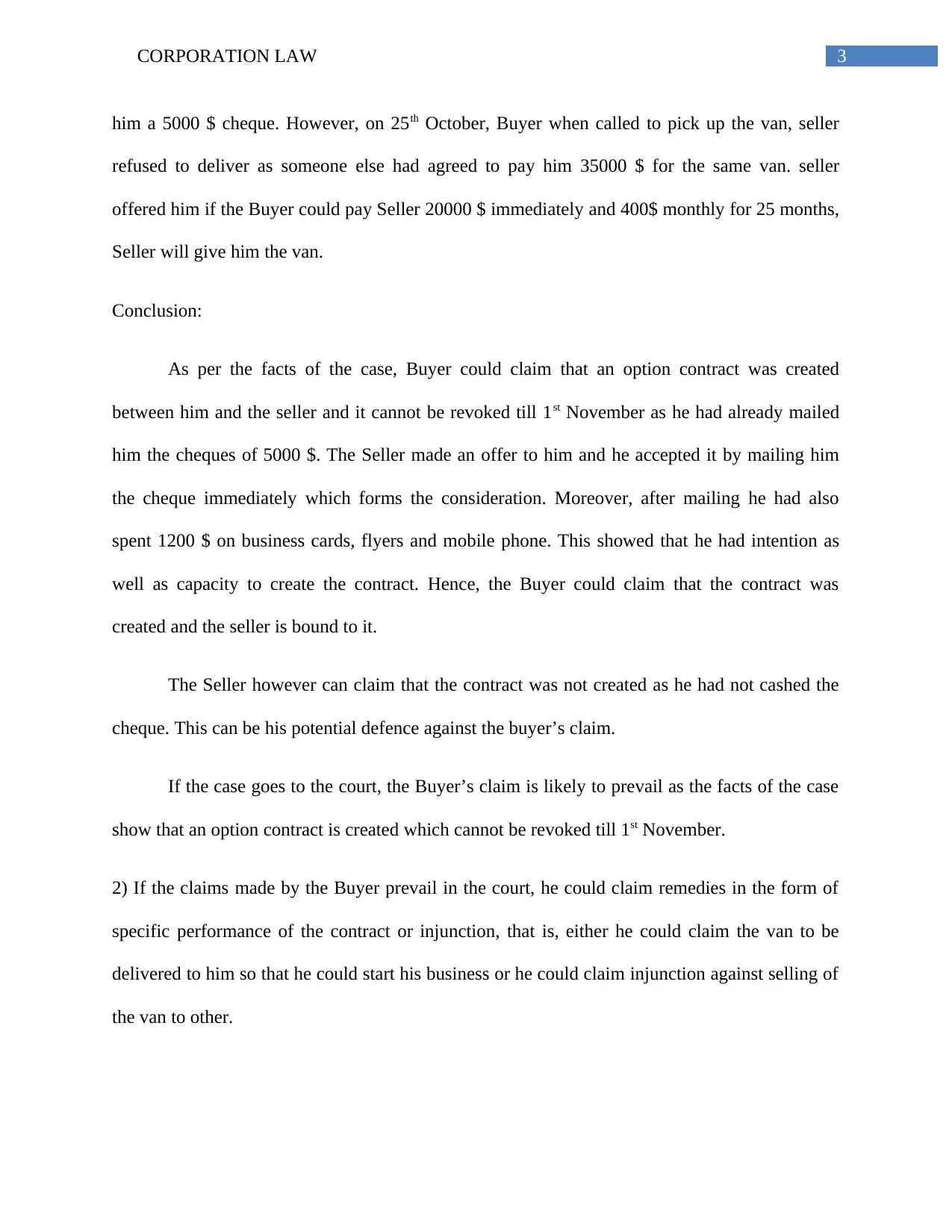
3CORPORATION LAW
him a 5000 $ cheque. However, on 25th October, Buyer when called to pick up the van, seller
refused to deliver as someone else had agreed to pay him 35000 $ for the same van. seller
offered him if the Buyer could pay Seller 20000 $ immediately and 400$ monthly for 25 months,
Seller will give him the van.
Conclusion:
As per the facts of the case, Buyer could claim that an option contract was created
between him and the seller and it cannot be revoked till 1st November as he had already mailed
him the cheques of 5000 $. The Seller made an offer to him and he accepted it by mailing him
the cheque immediately which forms the consideration. Moreover, after mailing he had also
spent 1200 $ on business cards, flyers and mobile phone. This showed that he had intention as
well as capacity to create the contract. Hence, the Buyer could claim that the contract was
created and the seller is bound to it.
The Seller however can claim that the contract was not created as he had not cashed the
cheque. This can be his potential defence against the buyer’s claim.
If the case goes to the court, the Buyer’s claim is likely to prevail as the facts of the case
show that an option contract is created which cannot be revoked till 1st November.
2) If the claims made by the Buyer prevail in the court, he could claim remedies in the form of
specific performance of the contract or injunction, that is, either he could claim the van to be
delivered to him so that he could start his business or he could claim injunction against selling of
the van to other.
him a 5000 $ cheque. However, on 25th October, Buyer when called to pick up the van, seller
refused to deliver as someone else had agreed to pay him 35000 $ for the same van. seller
offered him if the Buyer could pay Seller 20000 $ immediately and 400$ monthly for 25 months,
Seller will give him the van.
Conclusion:
As per the facts of the case, Buyer could claim that an option contract was created
between him and the seller and it cannot be revoked till 1st November as he had already mailed
him the cheques of 5000 $. The Seller made an offer to him and he accepted it by mailing him
the cheque immediately which forms the consideration. Moreover, after mailing he had also
spent 1200 $ on business cards, flyers and mobile phone. This showed that he had intention as
well as capacity to create the contract. Hence, the Buyer could claim that the contract was
created and the seller is bound to it.
The Seller however can claim that the contract was not created as he had not cashed the
cheque. This can be his potential defence against the buyer’s claim.
If the case goes to the court, the Buyer’s claim is likely to prevail as the facts of the case
show that an option contract is created which cannot be revoked till 1st November.
2) If the claims made by the Buyer prevail in the court, he could claim remedies in the form of
specific performance of the contract or injunction, that is, either he could claim the van to be
delivered to him so that he could start his business or he could claim injunction against selling of
the van to other.
Paraphrase This Document
Need a fresh take? Get an instant paraphrase of this document with our AI Paraphraser
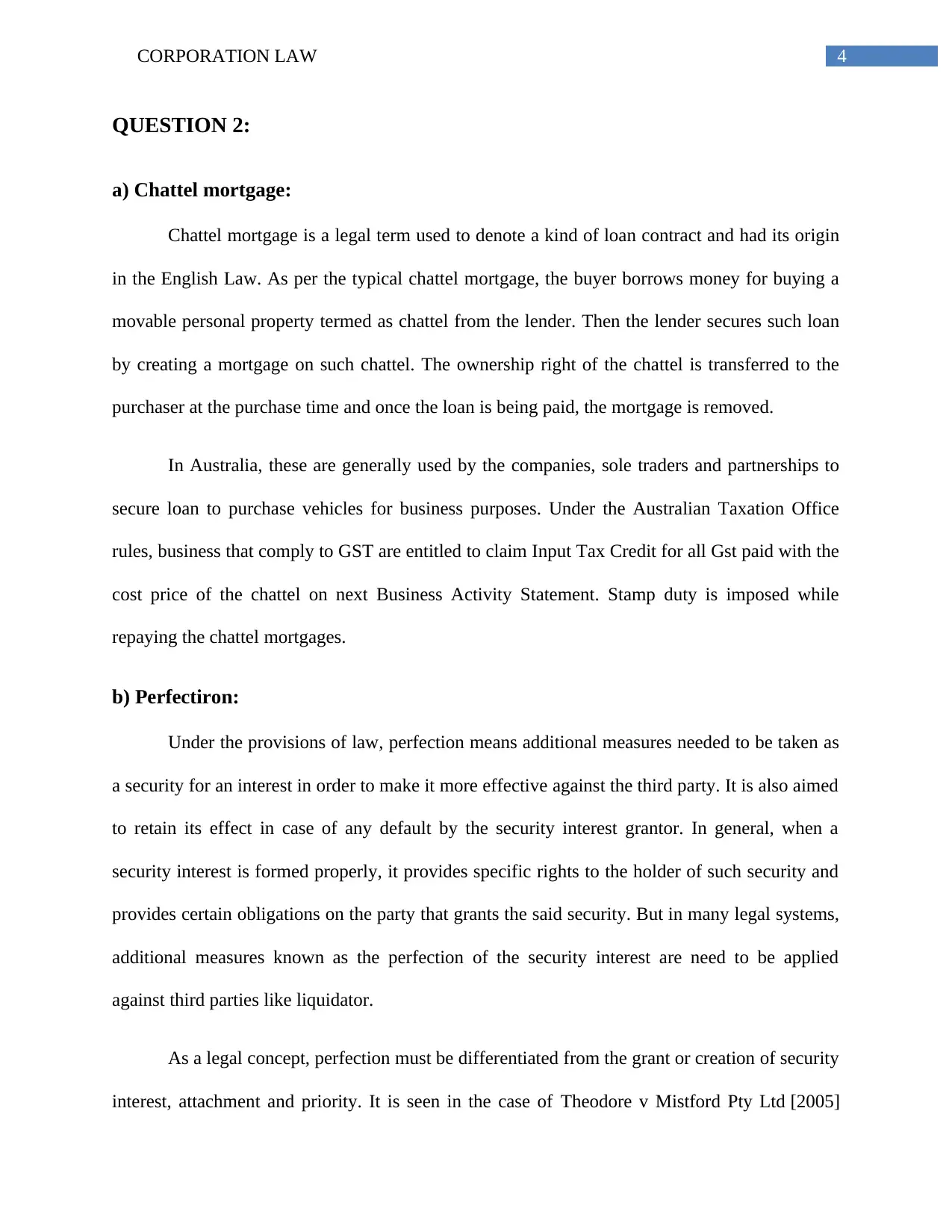
4CORPORATION LAW
QUESTION 2:
a) Chattel mortgage:
Chattel mortgage is a legal term used to denote a kind of loan contract and had its origin
in the English Law. As per the typical chattel mortgage, the buyer borrows money for buying a
movable personal property termed as chattel from the lender. Then the lender secures such loan
by creating a mortgage on such chattel. The ownership right of the chattel is transferred to the
purchaser at the purchase time and once the loan is being paid, the mortgage is removed.
In Australia, these are generally used by the companies, sole traders and partnerships to
secure loan to purchase vehicles for business purposes. Under the Australian Taxation Office
rules, business that comply to GST are entitled to claim Input Tax Credit for all Gst paid with the
cost price of the chattel on next Business Activity Statement. Stamp duty is imposed while
repaying the chattel mortgages.
b) Perfectiron:
Under the provisions of law, perfection means additional measures needed to be taken as
a security for an interest in order to make it more effective against the third party. It is also aimed
to retain its effect in case of any default by the security interest grantor. In general, when a
security interest is formed properly, it provides specific rights to the holder of such security and
provides certain obligations on the party that grants the said security. But in many legal systems,
additional measures known as the perfection of the security interest are need to be applied
against third parties like liquidator.
As a legal concept, perfection must be differentiated from the grant or creation of security
interest, attachment and priority. It is seen in the case of Theodore v Mistford Pty Ltd [2005]
QUESTION 2:
a) Chattel mortgage:
Chattel mortgage is a legal term used to denote a kind of loan contract and had its origin
in the English Law. As per the typical chattel mortgage, the buyer borrows money for buying a
movable personal property termed as chattel from the lender. Then the lender secures such loan
by creating a mortgage on such chattel. The ownership right of the chattel is transferred to the
purchaser at the purchase time and once the loan is being paid, the mortgage is removed.
In Australia, these are generally used by the companies, sole traders and partnerships to
secure loan to purchase vehicles for business purposes. Under the Australian Taxation Office
rules, business that comply to GST are entitled to claim Input Tax Credit for all Gst paid with the
cost price of the chattel on next Business Activity Statement. Stamp duty is imposed while
repaying the chattel mortgages.
b) Perfectiron:
Under the provisions of law, perfection means additional measures needed to be taken as
a security for an interest in order to make it more effective against the third party. It is also aimed
to retain its effect in case of any default by the security interest grantor. In general, when a
security interest is formed properly, it provides specific rights to the holder of such security and
provides certain obligations on the party that grants the said security. But in many legal systems,
additional measures known as the perfection of the security interest are need to be applied
against third parties like liquidator.
As a legal concept, perfection must be differentiated from the grant or creation of security
interest, attachment and priority. It is seen in the case of Theodore v Mistford Pty Ltd [2005]
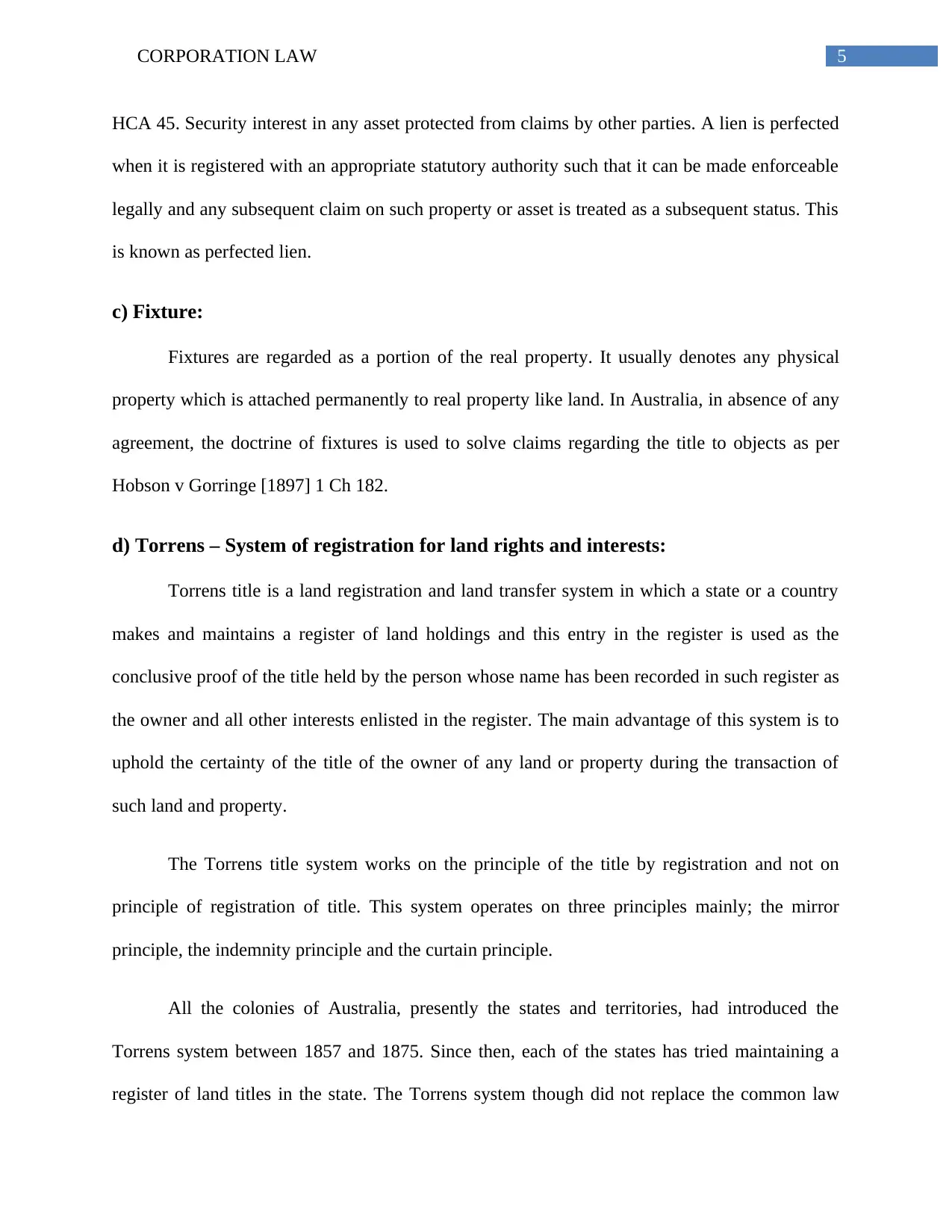
5CORPORATION LAW
HCA 45. Security interest in any asset protected from claims by other parties. A lien is perfected
when it is registered with an appropriate statutory authority such that it can be made enforceable
legally and any subsequent claim on such property or asset is treated as a subsequent status. This
is known as perfected lien.
c) Fixture:
Fixtures are regarded as a portion of the real property. It usually denotes any physical
property which is attached permanently to real property like land. In Australia, in absence of any
agreement, the doctrine of fixtures is used to solve claims regarding the title to objects as per
Hobson v Gorringe [1897] 1 Ch 182.
d) Torrens – System of registration for land rights and interests:
Torrens title is a land registration and land transfer system in which a state or a country
makes and maintains a register of land holdings and this entry in the register is used as the
conclusive proof of the title held by the person whose name has been recorded in such register as
the owner and all other interests enlisted in the register. The main advantage of this system is to
uphold the certainty of the title of the owner of any land or property during the transaction of
such land and property.
The Torrens title system works on the principle of the title by registration and not on
principle of registration of title. This system operates on three principles mainly; the mirror
principle, the indemnity principle and the curtain principle.
All the colonies of Australia, presently the states and territories, had introduced the
Torrens system between 1857 and 1875. Since then, each of the states has tried maintaining a
register of land titles in the state. The Torrens system though did not replace the common law
HCA 45. Security interest in any asset protected from claims by other parties. A lien is perfected
when it is registered with an appropriate statutory authority such that it can be made enforceable
legally and any subsequent claim on such property or asset is treated as a subsequent status. This
is known as perfected lien.
c) Fixture:
Fixtures are regarded as a portion of the real property. It usually denotes any physical
property which is attached permanently to real property like land. In Australia, in absence of any
agreement, the doctrine of fixtures is used to solve claims regarding the title to objects as per
Hobson v Gorringe [1897] 1 Ch 182.
d) Torrens – System of registration for land rights and interests:
Torrens title is a land registration and land transfer system in which a state or a country
makes and maintains a register of land holdings and this entry in the register is used as the
conclusive proof of the title held by the person whose name has been recorded in such register as
the owner and all other interests enlisted in the register. The main advantage of this system is to
uphold the certainty of the title of the owner of any land or property during the transaction of
such land and property.
The Torrens title system works on the principle of the title by registration and not on
principle of registration of title. This system operates on three principles mainly; the mirror
principle, the indemnity principle and the curtain principle.
All the colonies of Australia, presently the states and territories, had introduced the
Torrens system between 1857 and 1875. Since then, each of the states has tried maintaining a
register of land titles in the state. The Torrens system though did not replace the common law
⊘ This is a preview!⊘
Do you want full access?
Subscribe today to unlock all pages.

Trusted by 1+ million students worldwide
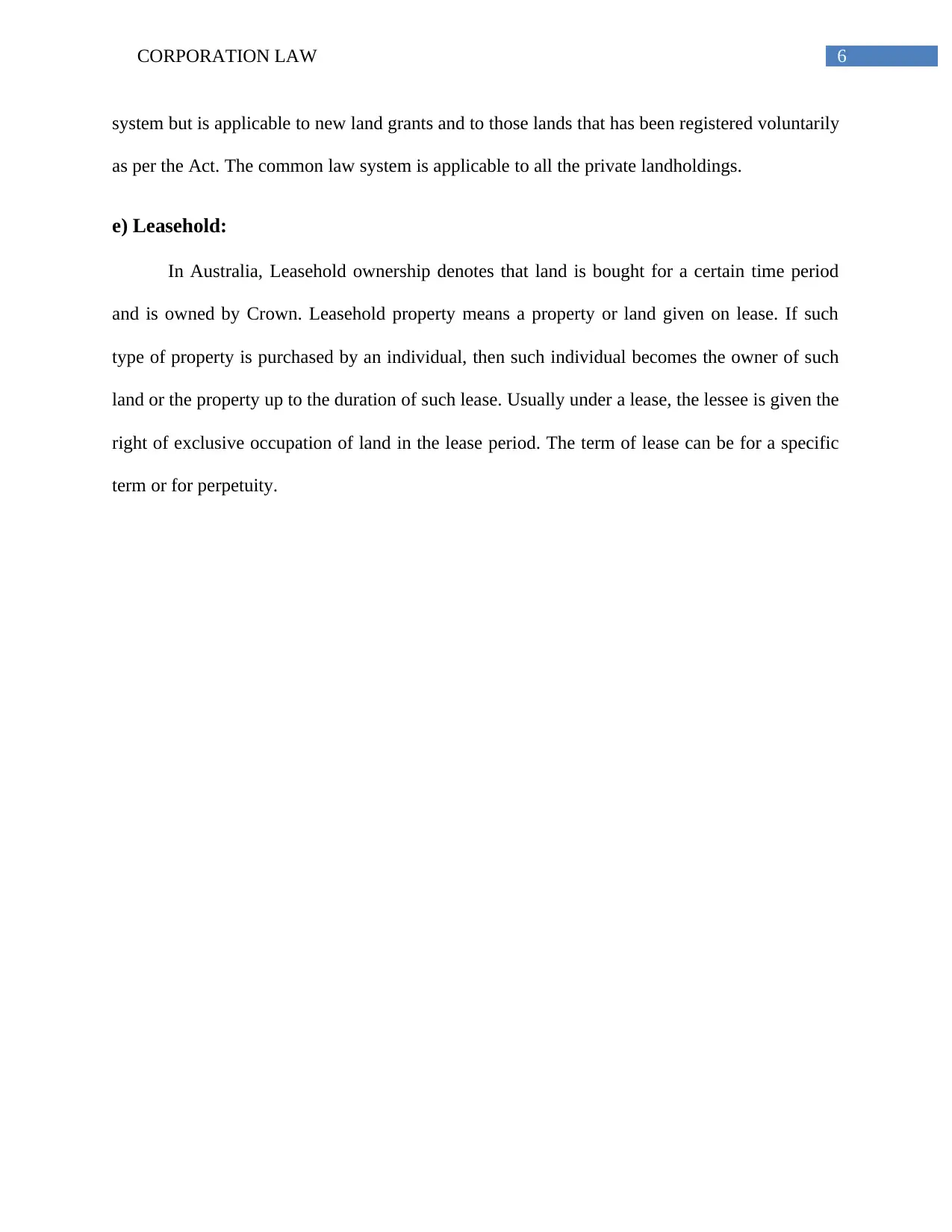
6CORPORATION LAW
system but is applicable to new land grants and to those lands that has been registered voluntarily
as per the Act. The common law system is applicable to all the private landholdings.
e) Leasehold:
In Australia, Leasehold ownership denotes that land is bought for a certain time period
and is owned by Crown. Leasehold property means a property or land given on lease. If such
type of property is purchased by an individual, then such individual becomes the owner of such
land or the property up to the duration of such lease. Usually under a lease, the lessee is given the
right of exclusive occupation of land in the lease period. The term of lease can be for a specific
term or for perpetuity.
system but is applicable to new land grants and to those lands that has been registered voluntarily
as per the Act. The common law system is applicable to all the private landholdings.
e) Leasehold:
In Australia, Leasehold ownership denotes that land is bought for a certain time period
and is owned by Crown. Leasehold property means a property or land given on lease. If such
type of property is purchased by an individual, then such individual becomes the owner of such
land or the property up to the duration of such lease. Usually under a lease, the lessee is given the
right of exclusive occupation of land in the lease period. The term of lease can be for a specific
term or for perpetuity.
Paraphrase This Document
Need a fresh take? Get an instant paraphrase of this document with our AI Paraphraser
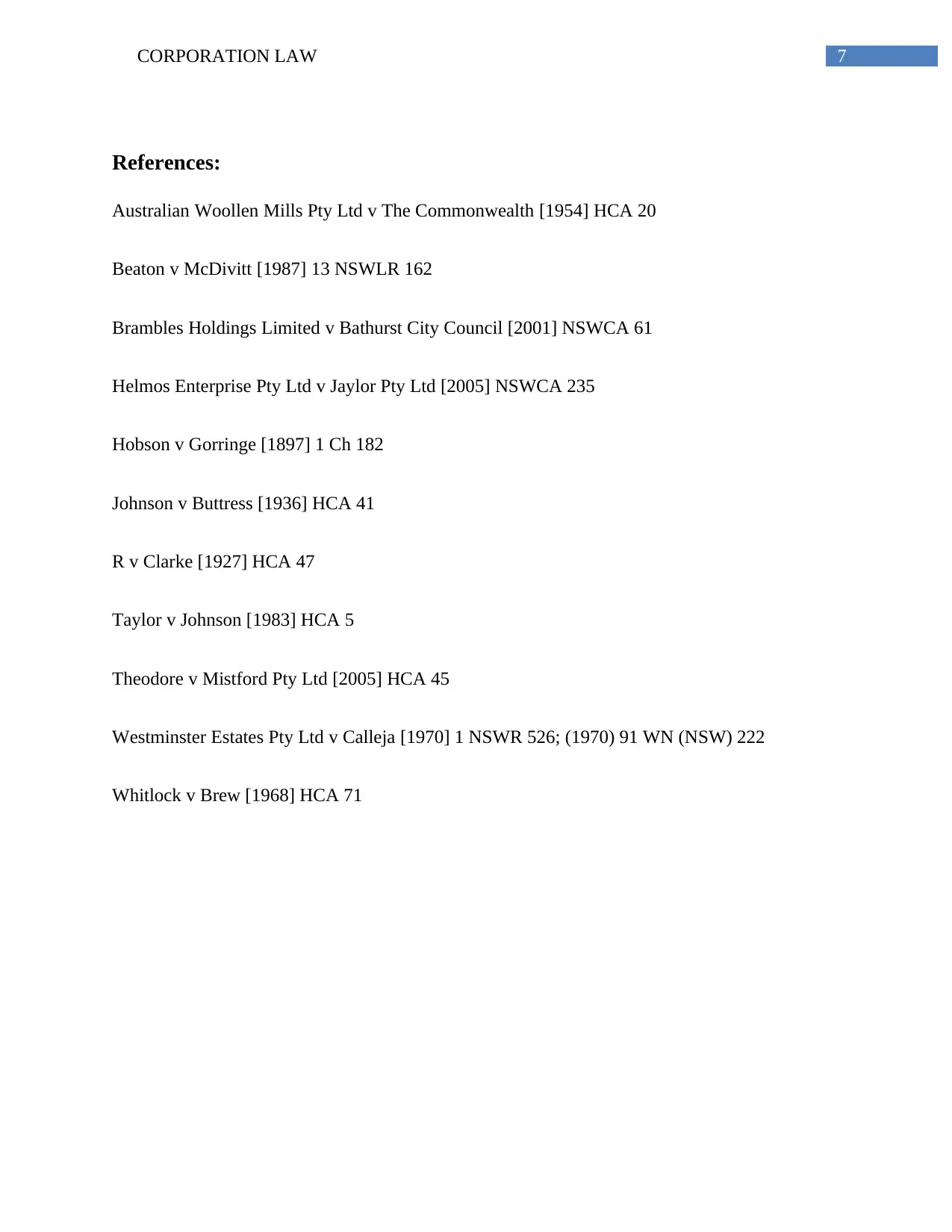
7CORPORATION LAW
References:
Australian Woollen Mills Pty Ltd v The Commonwealth [1954] HCA 20
Beaton v McDivitt [1987] 13 NSWLR 162
Brambles Holdings Limited v Bathurst City Council [2001] NSWCA 61
Helmos Enterprise Pty Ltd v Jaylor Pty Ltd [2005] NSWCA 235
Hobson v Gorringe [1897] 1 Ch 182
Johnson v Buttress [1936] HCA 41
R v Clarke [1927] HCA 47
Taylor v Johnson [1983] HCA 5
Theodore v Mistford Pty Ltd [2005] HCA 45
Westminster Estates Pty Ltd v Calleja [1970] 1 NSWR 526; (1970) 91 WN (NSW) 222
Whitlock v Brew [1968] HCA 71
References:
Australian Woollen Mills Pty Ltd v The Commonwealth [1954] HCA 20
Beaton v McDivitt [1987] 13 NSWLR 162
Brambles Holdings Limited v Bathurst City Council [2001] NSWCA 61
Helmos Enterprise Pty Ltd v Jaylor Pty Ltd [2005] NSWCA 235
Hobson v Gorringe [1897] 1 Ch 182
Johnson v Buttress [1936] HCA 41
R v Clarke [1927] HCA 47
Taylor v Johnson [1983] HCA 5
Theodore v Mistford Pty Ltd [2005] HCA 45
Westminster Estates Pty Ltd v Calleja [1970] 1 NSWR 526; (1970) 91 WN (NSW) 222
Whitlock v Brew [1968] HCA 71
1 out of 8
Related Documents
Your All-in-One AI-Powered Toolkit for Academic Success.
+13062052269
info@desklib.com
Available 24*7 on WhatsApp / Email
![[object Object]](/_next/static/media/star-bottom.7253800d.svg)
Unlock your academic potential
Copyright © 2020–2026 A2Z Services. All Rights Reserved. Developed and managed by ZUCOL.





